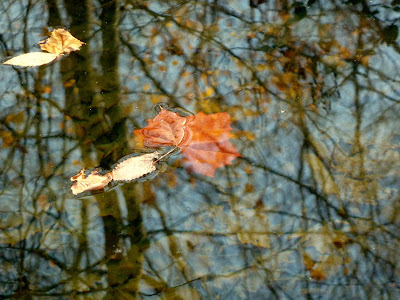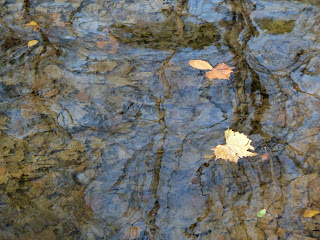More intimately, American poet Wallace Stevens also likened the dead of
the war to the season of autumn, but his poem “The Death of a Soldier” examines
the loss of a single man.
The Death of a Soldier
He does not
become a three-days’ personage,
Imposing his separation,
Calling for pomp.
Imposing his separation,
Calling for pomp.
Death is
absolute and without memorial,
As in a season of autumn,
When the wind stops.
As in a season of autumn,
When the wind stops.
When the wind
stops and, over the heavens,
The clouds go, nevertheless,
In their direction.
The clouds go, nevertheless,
In their direction.
--Wallace Stevens
As natural as
the change of the seasons is the death of a soldier; a man’s life narrows to a
single focal point of duty and orders, and “death is expected.” Yet for the common infantry soldier
(each of whom is not common at all to those who know and love him) death is accompanied by neither fame nor processions. His body does not lie in state; his photo
does not appear in the newspaper with tales of his courage. Instead, his name appears among hundreds of
others, a small line of print in the casualty lists, and his body is hastily
buried – if it can be found.
Despite this ordinary death, Stevens’
poem asks us to pause, to be still, and to honor the moment when one
soldier falls, “As in a season of autumn,/When the wind stops.” Each fallen man
is worthy of that moment of silence.
The highly
condensed three-line verses remind us of a life over too soon, and the
final line of each stanza is brief and blunt, mirroring the soldier’s abrupt
end. The clouds continue to pass across the sky; the army marches on without this
one man, and those he loved and left must also soldier on, although their lives are
the poorer for the loss. The poem forces us to acknowledge that the death of a soldier in battle is nothing remarkable, but rather
an expected event in the nature of war.
Wallace Stevens
is a key figure in the development of American modernist poetry, but his war
poems have been largely forgotten. Thirty-seven-years old when
America entered the war, Stevens did not serve in the American Expeditionary
Force, but continued to work as an insurance agent in Hartford, Connecticut. His poem “Death
of a Soldier” was written from the home front nearly one-hundred years ago, and yet it still challenges readers today, asking us to consider the too-often underestimated human costs of war.




Wonderful. As always. I realize I am coming to your posts late but that does not diminish them. Interesting to note that Stephens spent his working life on the elimination of risk. Here's Ronald Lewis Carton.
ReplyDeleteHereafter
It's Autumn-time on Salisbury Plain.
Let it be Autumn-time again
When life is cured of this black pain
And I go home, go home again,
By Highgate on the Hill.
For there's a little wood I know
Where all the trees of wonder grow,
And shadows like cool waters flow
'Twixt ivied banks on beds of moss,—
Mingle and merge and fade and cross.
And you may come and you may go
And never in that holy place
Look upon a German face.
The trees have all grown as they will
In the wood by Highgate on the Hill:
Great oaks with many a lichen sash
And elm and birch, and may and ash,
In twos and threes they stand together
In all the splendid autumn weather.
And in between and left and right
Are laurel bushes green and bright.
Acorns and chestnuts patter down
On leaves all gold and red and brown,
All gold and red and brown and grey
That dance the afternoon away.
October's quick and golden rains
Wander in rivers down the lanes,
Or make, in hollows, little ponds
Where pebbles shine like diamonds.
From breakfast-time till after tea
In ev'ry branch of ev'ry tree
The starlings, like a lot of boys,
For love of life make heaps of noise:
Such noise,—there is no gladder sound
In all the glad year's tuneful round;
Such placid anger, peaceful rage—
What actors on what airy stage,
What comedy for what a wage!
Children and birds and autumn trees,—
The world were well content with these.
When bloody William and his son
Are safely dead at last, and one
May go believing there's no dearth
Of glory yet upon the Earth,—
A glory, not of fire and smoke
And things that burst and blind and choke,
A wonder, not of eyes that turn
To some new thing to blast and burn,
A wisdom, not of thrusts and stabs
And stripes and stars and scarlet tabs,
A worship, not of poisoned breath
And little children done to death,—
These shall delight my soul at last
When then is now and now is past,
Where the many-scented dews distil
In the wood by Highgate on the Hill.
There I shall find forgotten themes,
And empty husks of faded dreams
Whose seed, far scattered, soon or late,
Shall find soft soil and germinate;
Remember I am still a boy
And haply rediscover joy,
Youth and all that follows after
Vanished vision and lost laughter.
All the wood will shout and sing
At my great remembering.
Ev'ry leaf will be a voice
Tuned to welcome and rejoice,
Sky and wind and blade and tree
Stretch forth hands to welcome me.
Deep in the wood lie hidden springs
Of half of life's delightful things.
A stirring leaf, a bird in flight
Will start soft flames of coloured light
That leap and dance and flash and burn
Through waving grass and feathery fern.
Music will tell an ancient tale
When moonrise wakes a nightingale.
Here is the rich, sweet smell of earth,
Movement and melody and mirth:
Such mirth as flashes from the eyes
Of Gabriel in Paradise,
Such melody as when he sings,
Such movement as his flaming wings,
For woods and Paradise are one
When seen beneath an autumn sun.
I shall be home again and hear
Sounds that subdue the soul's worst fear.
I shall be home again and find
All that is pitiful and kind,
Healing for nerves left torn and sore
By red monotony of War.
O Wood by Highgate on the Hill,
When fighting's over be there still!
Thanks so much, Josie, for sharing Carton's poem. I love its penultimate stanza and these lines:
ReplyDelete"Children and birds and autumn trees,—
The world were well content with these."
I also enjoy the way it seems to speak to Carola Oman's poem "To the Survivors": http://behindtheirlines.blogspot.com/2016/11/to-survivors.html
A most wonderful poem which connects the soldier's death with the falling leaves in autumn is by the Italian poet Giuseppe Ungaretti.
ReplyDeleteThe poem is eloquent in its brevity:
"Si sta
come d'autunno
sugli alberi
le foglie"
meaning
"It is", or perhaps rather "Things are"
as in autumn
on the trees
the leaves".
The poem, which recalls a scene from nature (the leaves that are still attached to the branches of the trees - but about to fall any moment now), might also refer to the poet musing about the brevity of life as such, a thought very much in step with the season (All Saints' & All Souls' Day).
The poet, however, entitles his poem "Soldati", Soldiers. He does not even write "I Soldati", "the" Soldiers, which makes the tone of his poem sound even more universal. It offers a touch of beauty in its simplicity.
Writing it during WWI, in all probability Ungaretti is referring to the brittleness of the soldier's - any soldier's, I should like to say - existence or fate in wartime.
I distinctly remember reciting this poem with a short word of comment, in the course of several group visits to the military cemeteries along the front line of the fields of Flanders around Ypres.
With all best wishes
Chris
Thanks for sharing this powerful short poem, Chris, and for adding your insights. As always, your comments are rich and much appreciated.
ReplyDelete